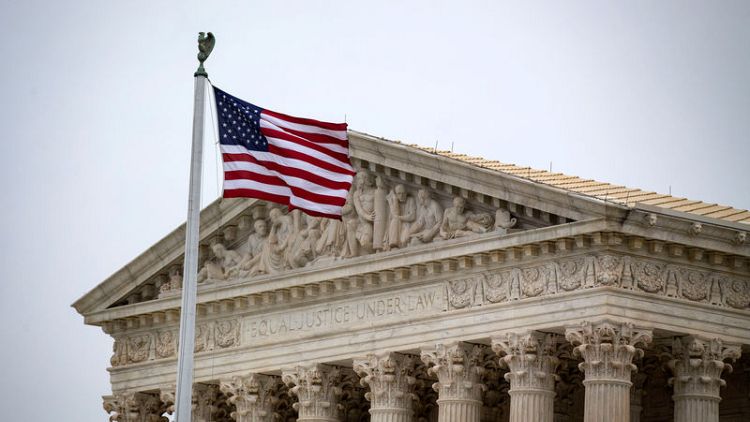By Andrew Chung
NEW YORK (Reuters) - Two weeks before Efrain Alvarez and his attorneys asked the U.S. Supreme Court to hear their challenge to a New York City regulation that limited where licensed handgun owners could transport their weapons, police officers showed up at his Bronx apartment and took away all his firearms.
The officers walked past the bullet-making equipment in his cluttered entranceway and past the trophy deer head hanging on his living room wall. From two imposing steel vaults in the back bedroom, they confiscated around 45 firearms, including five handguns.
"I'm still numb about it," the 64-year-old retired city bus driver said of the August 2018 seizure. "It's my lifelong collection."
The officers arrested Alvarez, and he was charged with filing a false police report over a claim that one of his handguns had been stolen, a misdemeanor. As a result, Alvarez said, the very handgun license whose transport restrictions he is challenging has been suspended for the second time this decade.
The legal battle over the New York measure is the biggest gun rights case at the Supreme Court since 2010, with the justices set to hear arguments next Monday. The challenge is backed by the National Rifle Association, an influential gun rights lobby group closely aligned with Republicans including President Donald Trump, a fellow New Yorker.
The regulation restricted transport of handguns by licensed owners to shooting ranges within city limits but allowed hunting during designated seasons. The lawsuit claims the measure violated the U.S. Constitution's Second Amendment right to keep and bear arms.
After the regulation was amended in July to allow for transporting handguns outside New York City, city officials unsuccessfully asked the Supreme Court to drop the matter and cancel the arguments, asserting that the case was moot.
The state's NRA affiliate, the New York State Rifle and Pistol Association, filed the lawsuit in 2013 with Alvarez and two other gun owners as plaintiffs, after authorities told the men that the regulation prevented them from participating at a shooting competition in New Jersey or bringing their guns to second homes elsewhere in the state.
Alvarez said he joined the suit because he thought it was ridiculous that he could own a handgun but not travel to compete with it.
In the lawsuit, he and the two other gun owners are described as "law-abiding residents of New York City." Alvarez does not think his own legal troubles make it awkward or inappropriate for him to challenge the regulation.
"My suspension has nothing to do with my fight in court," Alvarez said in an interview.
Alvarez also said he accepted a deal last week offered by the Bronx district attorney's office to drop the charge in six months if he is not arrested again.
Asked about Alvarez's arrest and license suspension, one of the plaintiffs' attorneys, Brian Stapleton, said it was the first he had heard of it.
"It has no impact on this case whatsoever," Stapleton said.
Describing himself as a supporter of gun control measures like strong background checks, Alvarez said he hopes the ruling in his case does not undermine other firearms restrictions.
"If a bad apple grabs a gun and he does something stupid, it kind of falls on me because I'm part of what's going on. So it would kind of hit a sore spot," added Alvarez, who said he admires the NRA but disagrees with some of its policies.
SUPREME COURT PRECEDENT
The plaintiffs appealed to the Supreme Court after a lower court found that the regulation did not violate the Second Amendment and advanced the city's interest in protecting public safety.
The Supreme Court in 2008 found for the first time that the Second Amendment protects an individual's right to keep a gun in the home for self-defense. In 2010, the court extended that right to state and local laws as well. But the justices have avoided ruling in a major firearms case since then, leaving open questions such as whether that right extends outside the home.
"I hope that they clarify that the right to posses a firearm outside the home is as important and fundamental as the right to possess one inside the home," Stapleton said.
Gun control advocates fear that the conservative-majority Supreme Court could use the case to expand gun rights and threaten a wide array of gun control measures nationwide such as expanded background checks and "red flag" laws targeting the firearms of people deemed dangerous by the courts.
"I don't think there's any question that, if given the opportunity, the NRA and its allies will try to re-challenge laws that have already been upheld and certainly challenge any new laws," said Eric Tirschwell, managing director of litigation at Everytown for Gun Safety, a gun control lobby group that receives funding from Democratic presidential candidate and former New York Mayor Michael Bloomberg.
Born and raised in New York, Alvarez is affable and blunt. He has been a gun enthusiast since serving in the U.S. National Guard decades ago. He said he became an avid hunter and started competitive shooting, winning several awards.
His hobby extends to making bullets, reloading spent casings in a mini-workshop that fills the vestibule of his Bronx apartment. He polishes the casings, melts the lead, pours the molds and sets the bullet heads with a pull of the press.
Alvarez's August 2018 arrest came after police said he falsely reported a .38 caliber revolver had been stolen by two men he claimed had fooled him by posing as police officers. The saga led police to suspend his handgun license and confiscate his firearms, he said. The New York Police Department declined to discuss Alvarez's case.
"Everybody who owns a firearm in New York City should have the right to take that firearm to his property, and out of the city to go shooting," Alvarez's said. "We're not looking for anything else as far as I'm concerned."
(Reporting by Andrew Chung; Editing by Will Dunham)


